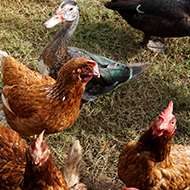
Bird keepers across England, Scotland and Wales now legally obliged to follow strict biosecurity measures.
The UK's chief veterinary officer has announced an Avian Influenza Prevention Zone (AIPZ) across Britain following several confirmed cases in captive and wild birds.
Under the AIPZ, keepers with 500 birds or more will need to restrict access for non-essential people on their sites. Workers will also be required to change their clothing and footwear before entering bird enclosures, and site vehicles will need cleaned and disinfected daily.
The move was announced by the UK Government on Wednesday evening (11 November), following discussions with Scottish and Welsh Governments to introduce national prevention zones at the same time.
The UK's chief veterinary officer, Christine Middlemiss, said: “I have today declared a national Avian Influenza Prevention Zone (AIPZ) legislating for actions all bird keepers must take to help prevent the disease spreading to more poultry and other domestic birds.
“Public Health England has confirmed that the risk to public health is very low and the Food Standards Agency advises that bird flu poses a very low food safety risk for UK consumers. Whether you keep just a few birds or thousands, you are now legally required to meet enhanced biosecurity requirements and this is in your interests to do, to protect your birds from this highly infectious disease.”
She added: “Backyard owners with smaller numbers of poultry including chickens, ducks and geese are also urged to strengthen their biosecurity measures in order to prevent further outbreaks of avian influenza in the UK.”
The introduction of the AIPZ follows two separate, unrelated cases of avian flu confirmed in Cheshire and Kent last week. Highly pathogenic H5N8 avian flu was also confirmed at a broiler breeder farm in Herefordshire on Wednesday (11 November).
A small number of wild birds in Gloucestershire, Devon and Dorset have also tested positive for the disease.
The introduction of the AIPZ follows a decision to raise the risk level for avian influenza incursion in wild birds in Great Britain from ‘medium’ to ‘high’.



 The latest
The latest